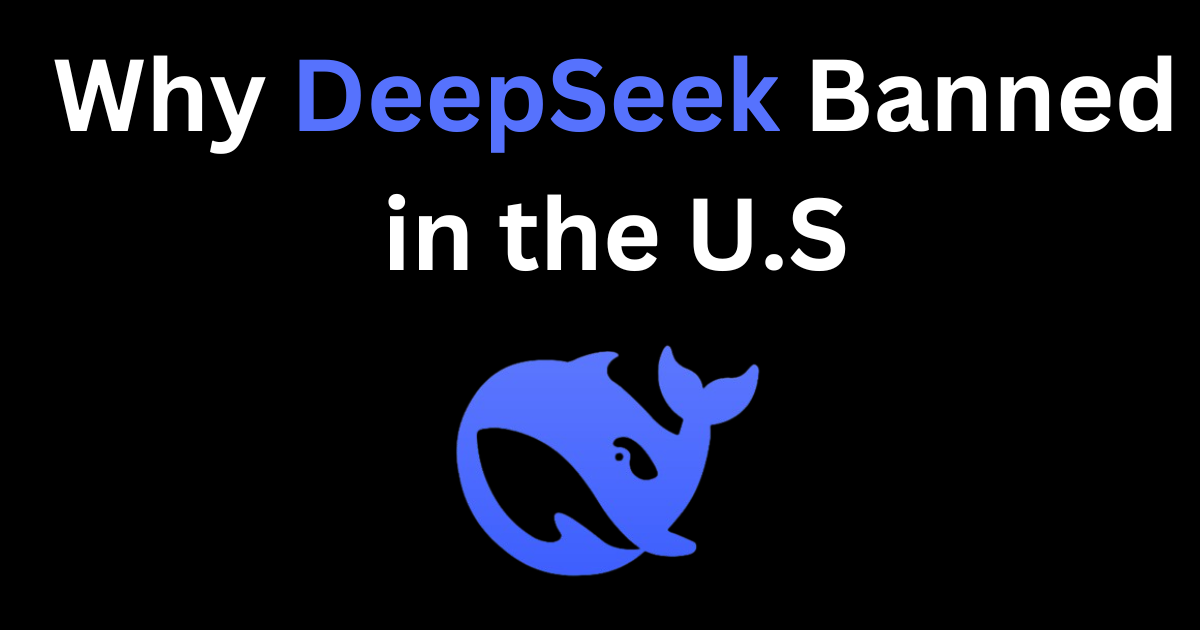DeepSeek Banned in the U.S In recent months, the tech world has been abuzz with news of DeepSeek, a popular AI-driven platform, being banned in the United States. This decision has sparked debates among tech enthusiasts, businesses, and policymakers. But what led to this ban, and what does it mean for the future of AI technology in the U.S.? In this article, we’ll dive into the reasons behind the DeepSeek ban, its implications, and what it could mean for the broader AI industry.
What is DeepSeek?
DeepSeek is an advanced artificial intelligence platform designed to streamline data analysis, automate decision-making processes, and provide predictive insights for businesses. Known for its cutting-edge algorithms and user-friendly interface, DeepSeek quickly gained popularity across industries, from finance to healthcare. However, its rapid rise to prominence also brought scrutiny from regulators and policymakers.
Why Was DeepSeek Banned in the U.S.?
The ban on DeepSeek in the U.S. stems from several key concerns government agencies and experts raised. Here are the primary reasons behind the decision:
- Data Privacy Concerns
One of the biggest issues with DeepSeek was its handling of user data. Critics argued that the platform’s data collection practices were invasive and lacked transparency. With growing concerns over data privacy and security, regulators deemed DeepSeek’s practices non-compliant with U.S. data protection laws, such as the General Data Protection Regulation (GDPR) and the California Consumer Privacy Act (CCPA). - National Security Risks
DeepSeek’s algorithms were capable of processing vast amounts of sensitive information, raising red flags about potential national security risks. U.S. officials expressed concerns that the platform could be exploited by foreign entities to access classified or proprietary data, posing a threat to national security. - Lack of Regulatory Compliance
DeepSeek’s operations were found to violate several U.S. regulations governing AI technologies. The platform failed to meet the stringent requirements set by agencies like the Federal Trade Commission (FTC) and the Department of Commerce, leading to its eventual ban. - Ethical Concerns
The use of AI in decision-making processes has long been a topic of ethical debate. DeepSeek’s algorithms were accused of perpetuating biases and making decisions that disproportionately affected certain groups. This lack of fairness and accountability further fueled the push for a ban.
Implications of the DeepSeek Ban
The ban on DeepSeek has far-reaching consequences for both the tech industry and businesses that relied on the platform. Here’s a closer look at the potential impacts:
- Disruption for Businesses
Many companies integrated DeepSeek into their operations to enhance efficiency and gain competitive advantages. With the ban, these businesses must now seek alternative solutions, which could lead to increased costs and operational challenges. - Impact on AI Innovation
The ban raises questions about the future of AI innovation in the U.S. While it highlights the need for stricter regulations, it could also stifle creativity and discourage startups from developing new AI technologies. - Global AI Competition
As the U.S. takes a cautious approach to AI regulation, other countries may seize the opportunity to lead in AI development. This could shift the balance of power in the global tech landscape, with nations like China and the European Union gaining an edge. - Increased Scrutiny on AI Platforms
The DeepSeek ban serves as a wake-up call for other AI platforms to prioritize compliance, transparency, and ethical practices. Companies will need to invest more in ensuring their technologies align with regulatory standards to avoid similar repercussions.
What’s Next for AI in the U.S.?
The DeepSeek ban underscores the importance of striking a balance between innovation and regulation. As AI continues to evolve, policymakers, tech companies, and stakeholders must work together to create a framework that fosters growth while safeguarding privacy, security, and ethical standards.
For businesses, the ban highlights the need to diversify their reliance on AI platforms and stay informed about regulatory changes. Investing in compliant and transparent AI solutions will be crucial for long-term success.
Conclusion
The ban on DeepSeek in the U.S. marks a significant moment in the ongoing debate over AI regulation. While it addresses critical concerns around data privacy, security, and ethics, it also raises important questions about the future of AI innovation. As the tech industry navigates this complex landscape, one thing is clear: the need for responsible and transparent AI development has never been greater.
Stay tuned for more updates on this evolving story and its impact on the world of technology. If you found this article helpful, share it with your network and join the conversation about the future of AI!
FAQ: DeepSeek Banned in the U.S.
1. What is DeepSeek?
DeepSeek is an advanced artificial intelligence platform designed to assist businesses with data analysis, decision-making automation, and predictive insights. It gained popularity for its powerful algorithms and user-friendly interface but faced scrutiny over data privacy and ethical concerns.
2. Why was DeepSeek banned in the U.S.?
DeepSeek was banned in the U.S. due to several reasons, including:
1. Data privacy concerns: Its data collection practices were deemed invasive and non-compliant with U.S. privacy laws.
2. National security risks: Regulators feared the platform could be exploited to access sensitive or classified information.
3. Regulatory non-compliance: DeepSeek failed to meet U.S. AI regulations set by agencies like the FTC and the Department of Commerce.
4. Ethical issues: The platform was accused of perpetuating biases in its decision-making processes.
3. How does the DeepSeek ban affect businesses?
Businesses that relied on DeepSeek for data analysis and automation may face disruptions, including:
1. Increased costs as they search for alternative AI solutions.
2. Operational challenges during the transition to new platforms.
3. Potential delays in decision-making processes.
4. What are the implications of the ban on AI innovation?
The ban highlights the need for stricter AI regulations but could also:
1. Stifle innovation by discouraging startups from developing new AI technologies.
2. Shift the global AI competition, with other countries potentially taking the lead in AI 3. development.
